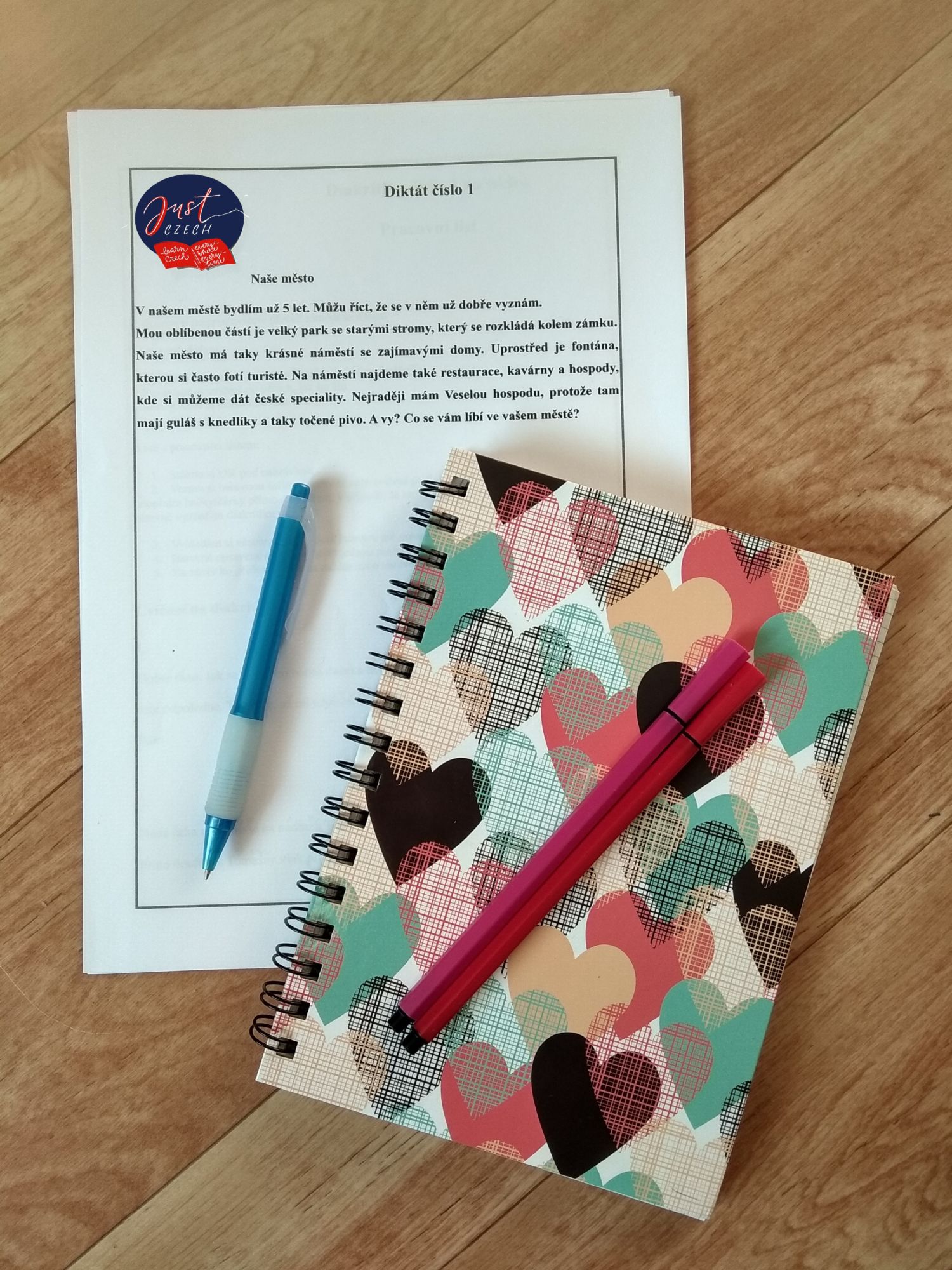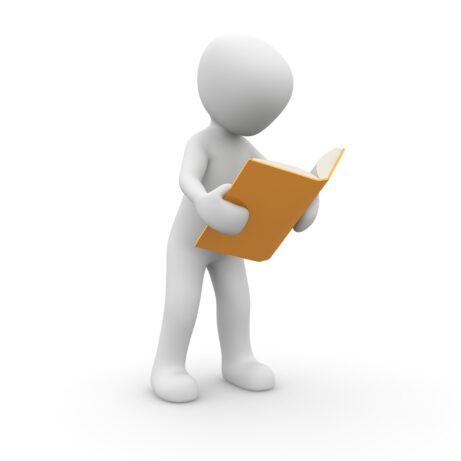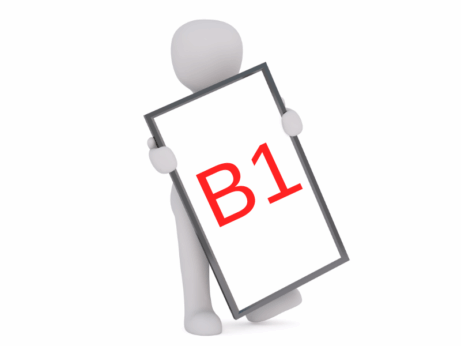
Což takhle dát si… diktát?! What about having… a dictation?!
(for English scroll down)
Co budeme potřebovat:
- vaši oblíbenou tužku
- barevnou tužku na opravu
- papír nebo sešit
- telefon k přehrání diktátu
- asi 30 minut času
Můj tip: doporučuji pořídit si speciální sešit nebo šanon, kam si můžete diktáty zakládat
- udržíte si tak pořádek v poznámkách
- budete se k nim moci kdykoliv pohodlně vracet
- rychleji najdete jazykový jev, který momentálně potřebujete
- uvidíte progres (není na škodu si diktáty datovat)
Ať už se psaním diktátu v cizím jazyce máte zkušenosti, či nikoliv, doporučuji alespoň pro začátek dodržovat postup v závěru článku!
Dneska vás v úvodu pozvu na krátký výlet zpět do školních lavic. Představte si, že jste zpátky na základní škole, do třídy přichází vaše učitelka a pronese obvyklou větu: „Napíšeme si diktát.“ Jaká je vaše reakce? S klidem vytáhnete tužku a sešit a čekáte, až se připraví ostatní? Probudí se ve vás frustrace, protože diktát nepatří mezi vaše oblíbené disciplíny a vždycky se najde několik slov, u kterých nevíte, jak je správně napsat? Zachvátí vás čirá panika, protože diktát se pro vás rovná rannímu dobíhání autobusu, který zavírá dveře pokaždé, když se jen zdánlivě přiblížíte ke konci věty?
Ať už jste odpověděli jakkoliv, zkusme teď udělat střih a podívat se na druhou situaci, která následuje o pár dní později. Učitelka opět přichází do třídy a přináší diktát opravený. Dostáváte známku nebo komentář, píše se oprava a tím to obvykle končí. Verdikt u většiny lidí zní: Umím/neumím psát diktát. Co nám ale mnohdy uniká, je smysl, proč vlastně diktát píšeme? Je to jako skákání přes kozu, ze kterého dostaneme známku, ale v životě ho přesně v tomto provedení nepoužijeme? Nebo nám může opravdu v něčem pomoct? Jednoznačně MŮŽE!
Opusťme nyní školní lavice a podívejme se, na kolika místech se v reálném životě s diktátem setkáváme:
- telefonáty – k doktorovi, na úřad, člověku, od kterého si na bazaru kupuju kolo
- setkání – rodičovská schůzka, mítink v práci, kurz, do kterého chodím ve volném čase
- předání jakékoliv informace – chci vědět, jak se jmenuje ta hospoda, ve které jsme byli minulý pátek, nebo ta kapela, co hrála v parku
Někdo teď může namítnout, že ne vždycky si musím zapisovat celý text. Lidé mi mohou informace zrekapitulovat v e-mailu nebo zprávě a dost často si informace nemusím zapisovat, ale můžu si je zapamatovat. To je samozřejmě pravda, ale ne vždy je tomu tak, a pokud budu trénovat s uceleným textem, bude pro mě pak pár frází o hodně jednodušších.
Můžu psát diktát, když:
- jsem začátečník
- chci se učit česky „jenom mluvit“
- nemám čas to dělat pravidelně
- nikdy jsem to nezkusil/a
- nemám k diktátu kladný vztah
5x ANO!
- dnešní diktát má středně pokročilou úroveň, může se tedy stát, že bude pro začátečníka obtížný. Nezoufejte ale, diktáty budou postupně přibývat a jejich úroveň bude různá. Pokud máte za sebou teprve pár hodiny češtiny, doporučuji místo diktátu vyzkoušet cvičení zaměřená na diakritiku TADY.
- Pokud se chcete učit česky „jenom mluvit“, diktát vám může pomoct s poslechem, výslovností a správným čtením nebo vás také přesvědčit o tom, že i psaní má své kouzlo 🙂
- pokud nemáte čas psát diktát pravidelně, zařaďte ho do studia češtiny alespoň čas od času na doplnění vašich obvyklých aktivit
- pokud jste to nikdy nezkusil/a, pak je načase vyzkoušet 🙂 Stejně jako v posledním případě, kdy nemáte k diktátu kladný vztah. Třeba mu v mimoškolním kontextu přijdete na chuť a začne vás bavit. Není nad to udělat si třeba diktátové odpoledne 😉
Co všechno mi psaní diktátů přináší:
- procvičuji si poslech
- procvičuji si psaní (grafická forma slova, diakritika, interpunkce)
- procvičuji si také výslovnost (často vyslovujeme nesprávně slovo, protože jsme se je naučili poslechem, neviděli je napsané, nebo je sami nepsali a prostě tam slyšíme jiné písmeno, než tam ve skutečnosti je – např. Říct x říst)
- pracuji s blokem ze psaní neznámých slov
- učím se nová slova
Jak s diktátem efektivně pracovat:
Práce s nahrávkou: (na konci článku)
- Poslechněte si jednou celý diktát (nic nepište). (první část nahrávky).
- Pište diktát po větách, jak ho diktuji. (druhá část nahrávky)
- Ještě jednou si ho celý poslechněte. (třetí část nahrávky)
- Přečtěte si pro sebe diktát, popř. opravte chyby.
Práce s klíčem: (na konci článku)
- Stáhnu si klíč pod diktátem
- Vezmu si barevnou tužku a opravím celý diktát podle textu:
– pokud mi chybí hlavně háčky, čárky a písmena, opravuji přímo do diktátu
– pokud mám špatně napsaná celá slova, vypíšu si je barevně (nebo je barevně označím pod text)
- Vyhledám si všechna slova, která jsou pro mě nová, a napíšu si pod diktát jejich význam
- Barevně opravený diktát si ještě jednou poslechnu
- Na závěr ho přečtu sám/sama nahlas nebo zároveň s nahrávkou
K diktátu se doporučuji vrátit druhý den nebo za několik dní a znovu si ho přečíst a projít slova, ve kterých jsem udělal/a chybu. Popř. si můžu vyzkoušet s odstupem napsat diktát znovu.
Diktát pro vás budu tvořit pravidelně, takže po pár lekcích získáte přehled o tom, jak na tom jste, jaká slova vám dělají problémy, a vytvoříte si nový studijní materiál.
Máte otázky nebo chcete sdílet vaše zkušenosti s diktátem? Přidejte se do naší uzavřené FB skupiny Tady

What about having… a dictation?!
Here’s what you’ll need:
- Your favorite pen
- A coloured pencil for correcting
- Something to write on
- Phone or computer to play recording
- About 30 minutes of your time 😊
My tips: I recommend keeping a special notebook or folder where you can keep your notes:
- Be sure to keep your notes neat and concise so that they are easy to read & review
- Keep them handy so that you can use them easily at your convenience
- Date & title your notes so that you can track progress and to help assist in making it easier to add relevant notes in the future
Whether you have experience with writing a dictation in another language or not, I recommend following the procedure at the end of the article, at least for the first time! 😊
Feel free to pause & rewind the recording at any time if you find it is too fast or adjust your audio device to a slower speed.
Today, I’d like for you to imagine that you are back in primary school and your teacher has said to the class „today you are going to listen to an audio clip and write what you hear.“ What is your reaction?
Will you calmly pull out a pencil and a notebook and wait for the others to prepare? Are you frustrated because dictation is not your favorite activity and there are always a few words that you miss and/or don’t know how to write correctly? Or are you panicked, because for you writing a dictation is like trying to walk through a brick wall?
Whatever your answer is, let’s move on for now and go forward a few days t o the second situation: The teacher comes to the class again and brings the class‘ corrected dictations. You receive yours back and you have a few corrective marks or comments . For most, this typically results in thinking either „I’m not bad with writing a dictation“ or „OMG! I can’t do this“
However, regardless of what your thought process may be, what we often miss is the reason as to why we are actually writing the dictation in the first place. Is it really just something that we are completing for only a grade, or will the knowledge and skills learn actually help us later on? The answer- it will DEFINITELY help later on out in the real world.
Let’s leave the school desks now and see how practicing dictation will help you with new languages when in the real world:
- When making a phone call to: a doctors office, a store to check their hours, a hotel, even when calling to order food.
- Meetings: parent-teacher meetings, inter-office meetings, or even a course or meet-up group you partake in during your free time.
- In general: when you want to know the name of the pub you went to last Friday, the name of the band that you saw in the park for your last Sunday Funday with your friends
Practicing your ability to write what your hear will help you to strengthen your language skills for numerous real-life situations.
Now, some may argue that it is not always necessary to write down the whole text. They can say that people could provide the information requested in the form of an email or SMS, or even that they can retain the information all via memorization and remembering what someone tells them. Of course, these points all can be true; however, in practicing writing clear & concise text then being able to correctly recall new phrases will become much easier.
Will a dictation help me if:
- I am just a beginner
- “I only need Czech for conversation“
- I don’t have time to do it regularly
- I’ve never tried it
- “I have always dreaded writing dictations“
The answer: YES! YES! YES! YES! And… YES!
- Today’s dictation is an intermediate level, so if you are a beginner it may be a bit challening, but don’t worry, I’ll prepare dictations a variety of dictations that will be on different levels. If you have only a few hours of Czech behind you, I recommend trying exercises that focus on sound accents exercise HERE instead of dictation.
- „If you only need Czech for conversation“, dictation can help you with listening, pronunciation, being able to reading with proper comprehension, and/or maybe even convince you that writing has its charm 🙂
- If you don’t have time to write a dictation regularly, start to include it in your routine at least from time to time to complement your usual activities
- If you have never tried it, then now it is the time to try 🙂
- And as for the last case, when you don’t have a positive attitude towards dictation. Maybe in an out-of-school context you will try it and start to enjoy it. Why not try an afternoon of dictation instead of another binge session of ‚How I Met Your Mother‘.
How writing a dictation can help me:
- to practise listening
- to practise writing (graphic form of a word, diacritics, punctuation)
- to practise pronunciation (we often pronounce the word incorrectly because we learned it by listening and didn’t see it written, or didn’t write it ourselves and we simply hear a different letter than what is actually there). For example, sometimes people pronounce the word „říct“ (to say) as „říst“ (to grow), and you can see how that may lead to an awkard conversation 😉
- to work with a block of writing unknown words
- to learn new words
How to work effectively with dictation:
When working with the recording:
- Listen to the entire dictation (do not write anything) – 1st part of the recording
- Write the dictation in sentences as you hear it. – 2nd part of the recording
- Listen to it once more. – 3rd part of the recording. – 3rd part od the recording
- Read the dictation for yourself, or correct the mistakes.
Working with a key:
- Download the key under the dictation
- Take a coloured pencil and correct the entire dictation as according to the text:
– if you mainly miss hooks, accents and letters, correct these mistakes directly on the dictation
– if you have misspelled entire words, write them down with a coloured pencil (or mark them in colour below the text)
3. Look up all the words that are new to you and write their meaning under the dictation
4. Listen to the colour-corrected dictation once again
5. Finally, read it aloud or in-sync with the recording
I recommend going back to the dictation the next day or in a few days to review and go through the words that you made mistakes on or that were more difficult for you. It would also be a good habit to attempt to write the dictation again a few days later.
I will create a dictation for you regularly, so after a few lessons you will get an overview of how you are doing and what words/sounds/letters are causing you the most difficulty, and this will help you to create new study material.
Do you have questions or want to share your experience with dictation? Join our closed FB group Here
CHCI KLÍČ/I WANT A KEY



